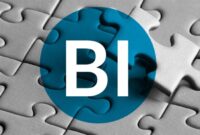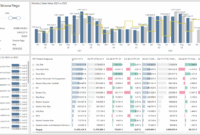Open Source BI Tools: Pros and Cons invites you to explore the fascinating realm of business intelligence tools that are open source, shedding light on their advantages and drawbacks. In a world where data-driven decisions are paramount, understanding these tools provides valuable insights for businesses looking to enhance their analytical capabilities without the hefty price tag of proprietary solutions.
By leveraging open source options, organizations can access powerful analytics and reporting tools while also benefiting from the flexibility to customize and extend functionalities as needed. However, potential challenges such as support issues, security concerns, and the need for technical expertise can arise, making it essential to weigh the pros and cons carefully before diving into the open-source arena.
In today’s fast-paced world, the importance of maintaining a balanced lifestyle cannot be overstated. With the constant hustle and bustle of everyday life, many individuals find it challenging to prioritize their health, well-being, and personal growth. This article delves into the various components that make up a balanced lifestyle and offers practical tips on how to achieve and sustain it.To begin with, a balanced lifestyle encompasses several key areas, including physical health, mental well-being, social relationships, and professional fulfillment.
Each segment plays an essential role in contributing to an individual’s overall quality of life. Let’s explore these components in greater detail.
1. Physical Health
The Foundation of Balance 
A diet rich in whole foods, including fruits, vegetables, lean proteins, and whole grains, supports energy levels and overall health. It’s essential to stay hydrated and limit the intake of processed foods, sugars, and unhealthy fats. Consider meal prepping to save time and ensure that healthy options are readily available.Sleep is often overlooked but is vital for maintaining physical and mental health.
Adults typically require 7-9 hours of quality sleep each night. Establishing a bedtime routine, reducing screen time before bed, and creating a comfortable sleep environment can greatly improve sleep quality.
2. Mental Well-Being
Cultivating Inner Peace
Writing down things you are thankful for can shift your perspective and improve overall happiness. Additionally, seeking professional help when needed—whether through therapy or counseling—can be a significant step towards better mental health.
3. Social Relationships
Building Connections
Volunteering in your community is another excellent avenue for connecting with others while making a positive impact. Remember, it’s not just about quantity but also the quality of relationships that contribute to a balanced life.
4. Professional Fulfillment
Finding Your Passion
Setting boundaries between work and personal life, such as defining work hours and unplugging from technology during downtime, can help create a healthier balance. Additionally, learning to say “no” when necessary is an important skill in managing your time and energy.
5. Personal Growth
Continuous Development
Remember that growth often comes with discomfort, so be open to embracing challenges and learning from failures. Conclusion: Striving for BalanceAchieving a balanced lifestyle is an ongoing journey rather than a fixed destination. It requires conscious effort, self-reflection, and a willingness to adapt to life’s changes. By focusing on physical health, mental well-being, social relationships, professional fulfillment, and personal growth, individuals can create a harmonious life that brings joy and satisfaction.Remember, balance looks different for everyone.
It’s essential to assess your own needs and priorities regularly. Take small steps towards creating a more balanced life, and don’t hesitate to seek support from others along the way. Embrace the process and celebrate your progress, no matter how incremental it may seem. A balanced lifestyle is not just a goal; it’s a way of life that can lead to long-term happiness and fulfillment.



